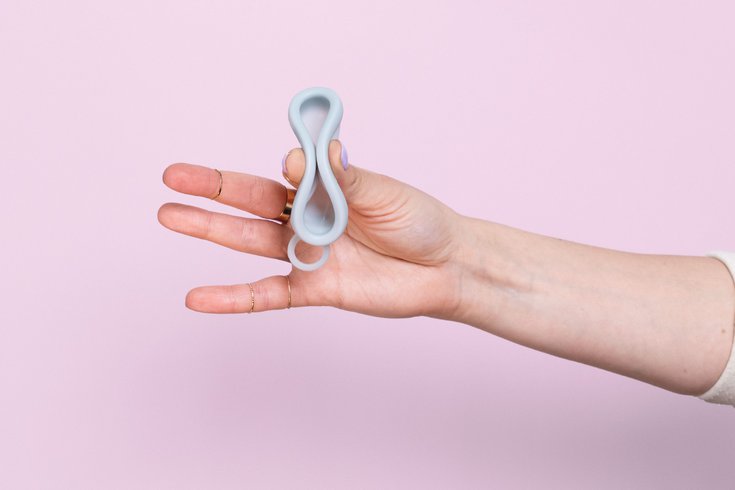
August 16, 2023
 Kim Rosas/Period Nirvana
Kim Rosas/Period Nirvana
Menstrual discs hold more blood than traditional period products like pads and tampons, according to the first study to test these products by using blood instead of water or saline.
Menstrual discs – insertable period products that provide up to 12 hours of protection against leaks – may be a better option for people who get heavy periods than traditional products like tampons or pads, according to a first-of-its-kind study.
Researchers tested a variety of menstrual discs, cups, tampons, pads and period underwear to determine each product's capacity to hold blood. Menstrual discs, on average, held 61 milliliters of blood, the most of any product. One brand, Ziggy, held up to 80 milliliters. Period underwear and perineal cold packs — which are used to relief postpartum discomfort — held the least, with just 3 milliliters each. Tampons, pads and menstrual cups held 20 to 70 milliliters of blood.
The study, published earlier this month, marked the first time that researchers used blood, rather than water or saline, to test the absorbency of menstrual products.
Heavy menstrual bleeding impacts about one-third of people who menstruate and often has a negative impact on quality of life. The diagnosis typically is made by assessing a patient's menstruation history, and is dependent on traditional period products like pads and tampons. Tampons are the only period products that undergo industry testing for absorption capacity.
Heavy menstrual bleeding occurs when bleeding lasts longer than seven days, soaks through one or more tampons or pads hourly for several hours in a row, includes blood clots that are as big as a quarter, requires the use of more than one pad to control menstrual flow or requires tampons or pads to be changed multiple times overnight, according to the American College of Obstetricians and Gynecologists.
"We have noticed a lot of folks — particularly those with heavy periods — are moving toward cups and discs, and realized we don't really have a good metric to diagnose heavy bleeding utilizing those methods, as all the currently available methods are dependent on pads and tampons," Dr. Bethany Samuelson Bannow, one of the study's authors, a hematologist at Oregon Health & Science University in Portland, told Everyday Health. "The use of blood matters, as it is, literally, thicker than water and therefore we expected — and we saw — different absorption with blood instead of water."
Alternatives to tampons and pads have grown in popularity in recent years, with people opting for menstrual discs, menstrual cups or period underwear in lieu of traditional methods.
Menstrual discs and cups are both insertable products, though unlike tampons, they collect blood rather than absorb it. Both products are meant to be washable and reusable. Discs are held in place at the base of the cervix and can be used for up to 12 hours. They also can be used during sex, unlike other insertable products. Cups are held in the vaginal canal and can be worn for up to 12 hours before needing to be removed, washed and reinserted.
Amid the national tampon shortage last year, gynecologists recommended these period alternatives in lieu of disposable products. Menstrual cups and discs often are more expensive than traditional pads and tampons, but they are meant to be used regularly for up to one year.
Menstrual blood is composed of three bodily fluids, including blood, vaginal fluid and cells and fluid from the uterine endometrial lining, which sheds during menstruation. People who menstruate have more than 400 cycles during their lifetimes, according to an editorial that accompanied the study. It was written by gynecology experts at Stanford University.
Understanding the true capacity of menstrual products can help doctors determine whether a person needs additional testing or treatments, including for conditions like anemia, endometriosis or polycystic ovarian syndrome, the Stanford experts wrote. Just one study about menstrual blood was published between 1941 and 1950, and about 400 were published over the last several decades. By contrast, about 10,000 studies about erectile dysfunction were published during the same time period.
Menstruation is something that happens naturally, though it's often associated with stigma, the editorial noted. Period stigma is a broad term that encapsulates problems with accessing menstrual products, verbal shaming of people who menstruate as "dirty" and the lack of open discussions about periods, VeryWell Health reported.
"I always encourage people to talk about periods more," Bannow told Everyday Health. "So many people suffer from menstrual concerns like heavy menstrual bleeding because of the stigma and taboo around discussion. They just don't know what is 'normal' or what is OK. The more we talk about periods and normalize that discussion, the better off everyone will be."
Barrow encourages people, particularly those with heavy bleeding, to speak with medical providers to determine whether they can reduce the amount of bleeding, rather than trying to find more absorbent period products, Health reported.